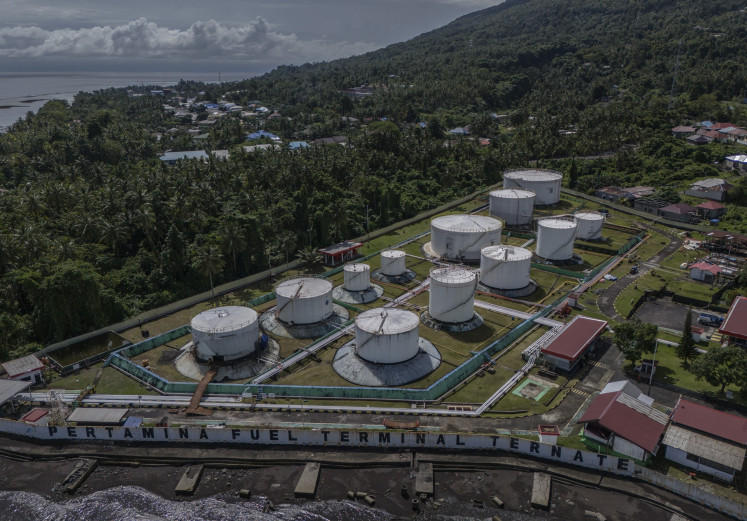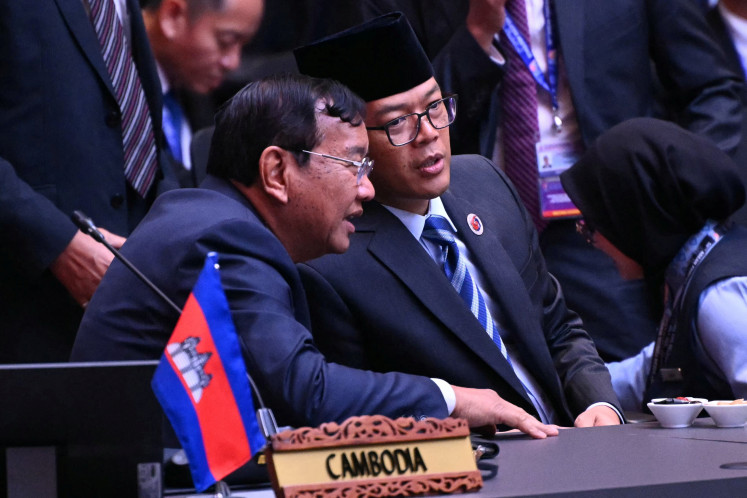Popular Reads
Top Results
Can't find what you're looking for?
View all search resultsPopular Reads
Top Results
Can't find what you're looking for?
View all search resultsGlobal economic crisis and Indonesia
The financial crisis that first emerged in the US in August 2007 has transformed into a global economic and job crisis
Change text size
Gift Premium Articles
to Anyone
The financial crisis that first emerged in the US in August 2007 has transformed into a global economic and job crisis. The latest projections from multilateral agencies suggest that the world economy will contract in 2009 for the first time since the Second World War.
According to the World Bank, the spreading global economic crisis is set to trap up to 53 million more people in poverty in developing countries this year on top of the 130-155 million driven into poverty in 2008 by soaring food and fuel prices.
This will bring the total of those living on less than US$2 a day to over 1.5 billion.
The World Bank also estimates that developing countries face a financing gap of $270-$700 billion depending on the severity of the economic and financial crisis and the strength and timing of policy responses.
Developing countries are likely to face higher spreads, and lower capital flows than over the past 7-8 years, leading to weaker investment and slower growth in the future.
What is the likely impact of the most severe global recession since the Second World War on the Indonesian economy?
How has the Indonesian government responded to the rapidly deteriorating international economic environment?
At the beginning of 2008, there was considerable optimism that the Indonesian economy, unlike the 1997 financial crisis, would largely escape the effects of a looming global economic downturn.
By 2007, growth had reached 6.3 percent, the highest in the post-crisis period. The economy was poised to post a similar growth rate in 2008.
The stock market was booming and reached the highest level in its history in January 2008.
Indeed, in a January 2008 paper that assessed the medium-term economic outlook for Indonesia, Bank Indonesia observed:
The overall forecast is for further improvement in the Indonesian economy in the coming five years with growth in the range of 7.4-8.0 percent. This projection assumes that world economic growth and volume of world trade remain strong alongside sustained high prices for oil and natural gas and non-oil commodities, relative stability in world and Indonesian monetary policy, robust fiscal conditions in Indonesia and rising inflows of FDI in Indonesia.
The major sources of this growth will be significant inflows of FDI stimulated by improvements in the investment climate with FDI reaching 1.5 percent of GDP in 2012, bringing the share of investment to about 30 percent of GDP that year."
Throughout much of 2008, the monetary authorities seemed concerned with containing inflationary pressures stemming from the dual food and energy shocks. The official interest rate was increased from 8.0 percent in January 2008 to 9.5 percent in November 2008.
Since then, the mood of policy-makers has shifted. In its report on monetary policy in the final quarter of 2008, Bank Indonesia noted that *In Q4/2008, Indonesia's economic performance began to show signs of impact from the global economic downturn'.
The stock market plummeted reversing all the gains that took place between 2005 and 2008. The exchange rate depreciated significantly.
Official projections are that growth will be around 4 to 5 percent in 2009, but private sector forecasts suggest a *worst-case' scenario of 2.5 percent growth in 2009.
A recent World Bank policy note classifies Indonesia as a *high exposure' country that faces significant crisis-induced deceleration of growth and a significant increase in poverty.
The Indonesian government has responded to the rapidly evolving global economic crisis with a combination of financial, monetary and fiscal policies. The deposit guarantee scheme for the banking system has been substantially increased to encourage continued lending to the real economy.
Monetary policy has been eased. The interest rate (as of March 4, 2009) stands at 7.75 percent, the lowest level since July 2005.
The Governor of the Bank of Indonesia, during a speech given at the 2009 Banker's Dinner, noted that the official interest rate is likely to be in the 5 to 7 percent range. A fiscal stimulus package has been enacted (effective from March 1, 2009) amounting to 1.4 percent of GDP.
It is doubtful whether these responses are going to be effective in dealing with the *worst-case' consequences of the global recession on Indonesia. Ross McLeod, a well known Indonesia specialist, notes that although the deposit guarantee scheme has been *increased by a factor of 20 . it still covers only about 50 percent of the total value of assets.
If conditions deteriorate, there is every possibility of a run on banks by large depositors'. While the reductions in the official interest rate are welcome, one wonders whether the rate was held too high for too long.
Given that monetary policy operates with a long and variable lag, it is difficult to assess the extent which the current easing of monetary policy can offset the effects of a phase of tightening that was sustained between January and November 2008.
The fiscal stimulus package deserves further scrutiny. If the worst case scenario of growth falling well below the projected 4 percent rate materializes, then the magnitude of the fiscal policy response may not be enough.
One can also express reservations about the composition of the fiscal policy package. Approximately 77 percent of the Rp73.3 trillion is in the form of tax cuts. They consist of reductions in both indirect taxes and income taxes.
The balance is directed towards infrastructure expenditure (Rp12.2 trillion) and direct subsidies (Rp4.8 trillion). Thus, a modest amount has been allocated towards enhancing job-creating public expenditure and hardly any resources seem to have been directed towards scaling up the social protection system.
Yet, it is widely acknowledged that tax cuts are not as effective as job-creating public expenditure or a scaled up social protection system in dealing with the consequences of a systemic global economic downturn.
The Indonesian government seems to have designed its fiscal stimulus package by focusing on its impact on the unemployment rate. A *simulation' exercise was undertaken by the Coordinating Ministry to work out how the unemployment rate will behave with expansionary fiscal policy and without it.
The exercise that was undertaken demonstrated that fiscal expansion along the lines described here would contain the rise in the unemployment rate to a prescribed threshold (8.3 percent in 2009).
Given the nature and structure of the Indonesian labour market, the aggregate unemployment rate is not a robust indicator of the well-being of the Indonesian work-force.
A lot more attention should have been given to poverty-sensitive indicators in designing the fiscal stimulus package.
In sum, throughout much of 2008, the Indonesian government did not seem particularly perturbed by the rapidly unfolding global economic crisis and its implications for the national economy.
There was a growing realisation in the final quarter of 2008 that Indonesia will not be immune to the global economic downturn.
It remains to be seen how effective national policy responses will be in dealing with the growing challenge of sustaining growth in the grim international environment of today.
One must also appreciate the fact that a global recession of the severity and magnitude facing the world today requires globally coordinated action. Indonesia, as a member of the G20, has an opportunity to play a pro-active role in urging such collective action.
Domestically, Indonesia must position itself among other developing countries so that it can be among the first to benefit from the global recovery.
Iyanatul Islam, Professor of International Business, Griffith University, Australia, currently working at the ILO, Geneva. Anis Chowdhury, Professor of Economics, University of Western Sydney, Australia, currently working at UN-DESA, New York. Views expressed here are entirely personal and must not be attributed to the organisations they are associated with. Both worked in Indonesia with UN agencies, following the 1997/1998 crisis.










